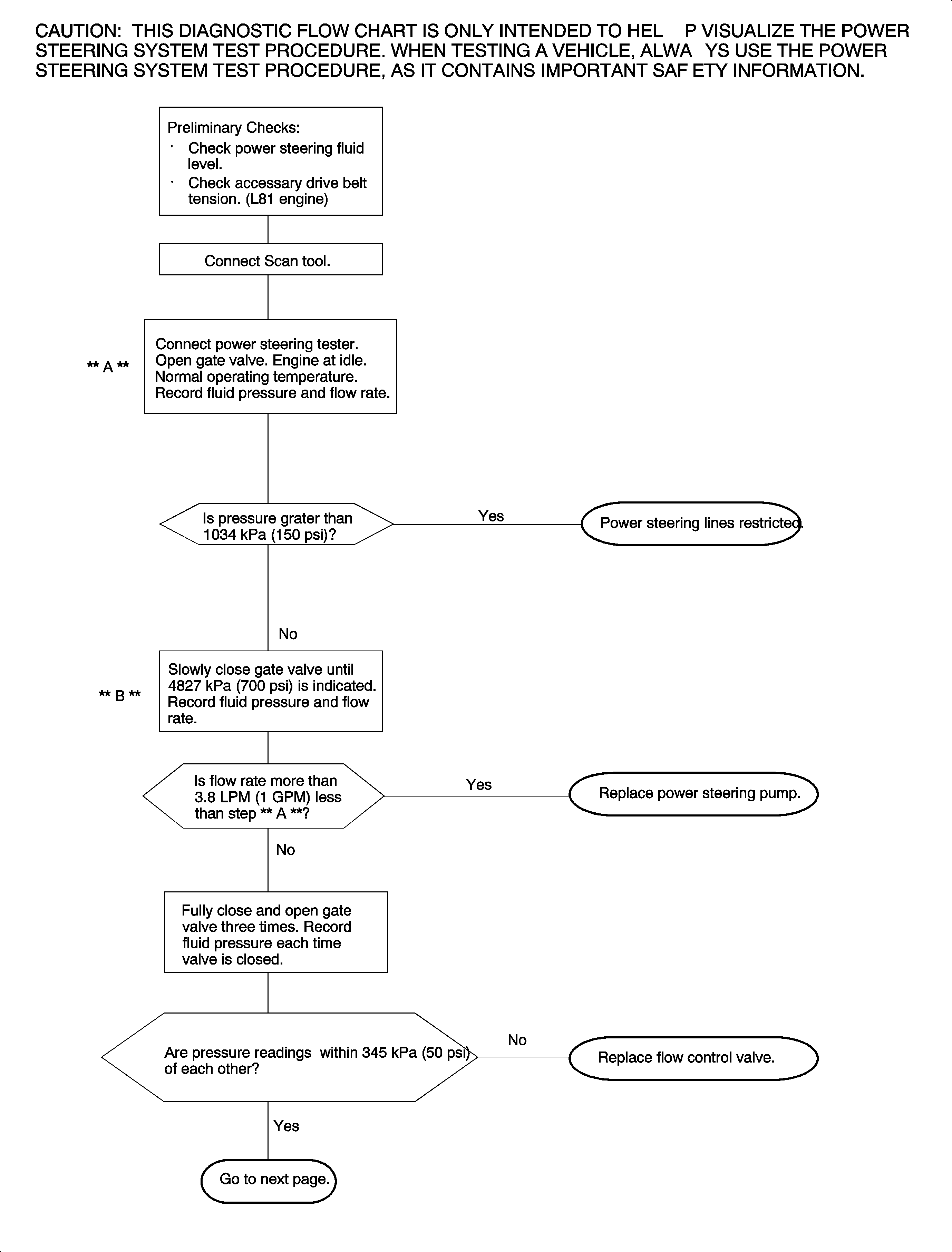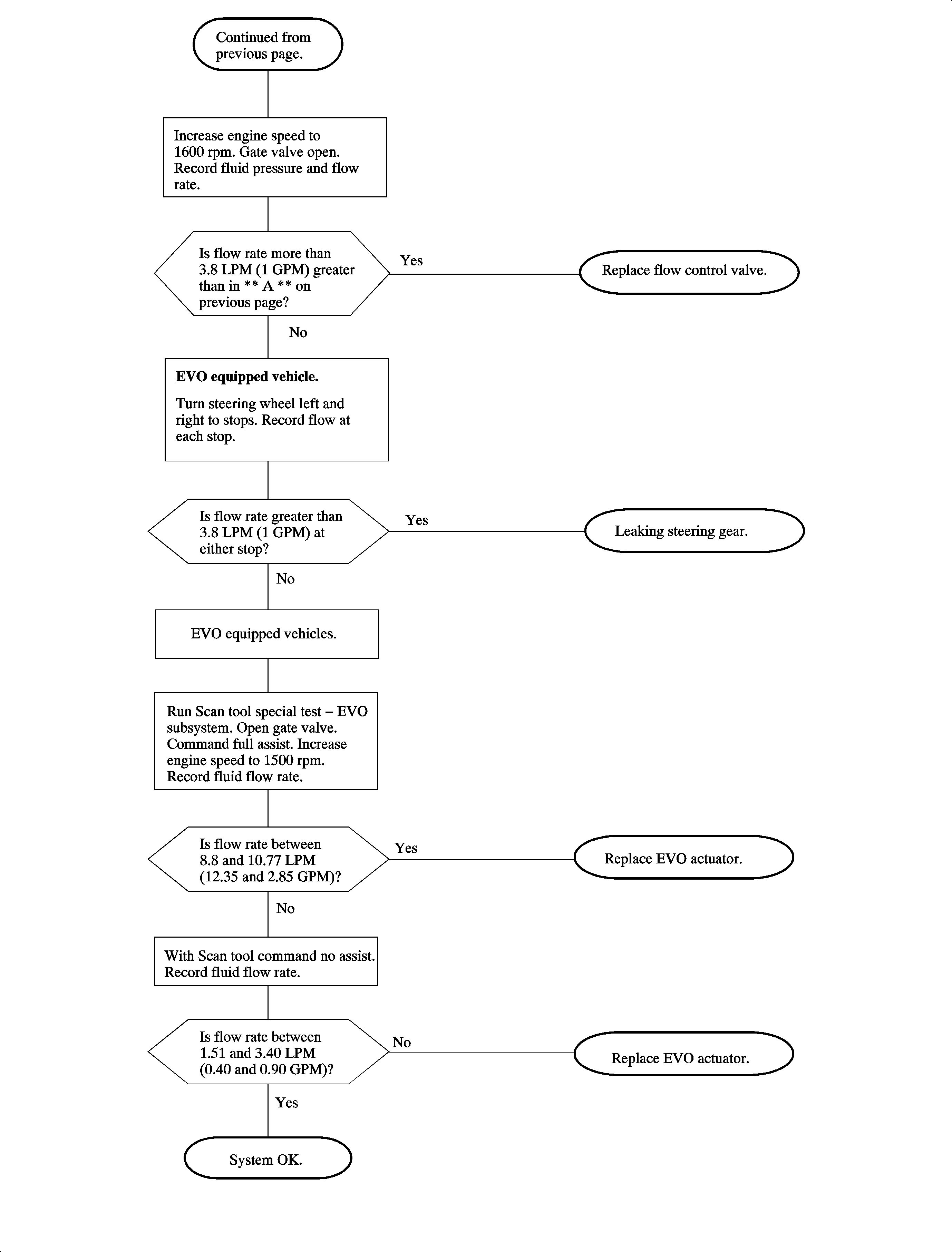For 1990-2009 cars only
To properly test the Saturn power steering system, the following tests should be performed, in the order presented.
Test 1 - Preliminary Checks
- Check power steering fluid level.
- Check accessory drive belt for slippage.
- Check that electrical connections on the EVO actuator (DOHC only) are tight and clean.
Test 2 - Power Steering System Hydraulic Test
- Disconnect high pressure line at the steering gear and install SA9134C Power Steering Analyzer (or equivalent).
- Open the gate valve on the power steering system tester.
- Run engine until it has reached normal operating temperature. Replace any power steering fluid lost during power steering tester installation. Bleed system if necessary. Refer to Power Steering System Bleeding .
- With engine idling, record power steering fluid pressure and flow rate. If pressure reading is greater than 1034 kPa (150 psi), stop engine and check power steering lines for restrictions.
- Slowly close gate valve until 4827 kPa (700 psi) is indicated on the power steering tester. Record power steering fluid pressure and flow rate. The flow rate observed should not drop 3.8 LPM (1 GPM) or more, replace the ring, rotor, and vanes in the pump. Also, check pressure plate and thrust plates for wear. Replace if required.
- Fully close and open gate valve three times.
- Record power steering fluid pressure each time the valve is closed. All three readings should be within 345 kPa (50 psi) of each other. If not, replace the flow control valve.
- With gate valve open, increase engine speed to 1600 rpm and record power steering fluid pressure and flow rate.
- The flow rate should not vary more than 3.8 LPM (1 GPM) from the flow rate recorded in step 4. If the flow rate does vary 3.8 LPM (1 GPM) or more, check that the flow control valve moves freely in the pump housing. Inspect valve for burrs. If present, remove with crocus cloth or a fine hone.
- Turn steering wheel all the way to the left, then all the way to the right. Record power steering fluid pressure and flow rate at each stop. If flow is greater than 3.8 LPM (1 GPM) at either stop, the steering gear is leaking internally and must be replaced.
- After completing flow test, stop engine and remove power steering reservoir cap to release system pressure prior to removing analyzer.
Important: Do not turn steering wheel while performing this test. This will lead to inaccurate results.
Notice: Do not close gate valve for more than 5 seconds at a time. This may damage the power steering pump.
Important: Do not turn steering wheel while performing this test. This will lead to inaccurate results.
Test 3 - EVO (DOHC and RHD) Subsystem Test
- Disconnect high pressure line at the power steering pump and installSA9134C Power Steering System Tester SST (or equivalent).
- Install scan tool to the data link connector (DLC).
- Open the gate valve on Power Steering System Tester.
- Run engine until it has reached normal operating temperature. Replace any power steering fluid lost during power steering tester installation. Bleed system if necessary. (Refer to "Power Steering System Bleed" procedure in this service manual).
- Using the Scan tool, select EVO subsystem in the special test menu.
- With the Scan tool, command the EVO actuator to provide full assist (0% duty cycle). Increase engine speed to 1500 rpm and maintain this speed while observing flow rate. Record power steering fluid flow rate as indicated on power steering system tester. The flow rate should be between 8.88-10.77 LPM (2.35-2.85 GPM). If not within this range, replace EVO actuator.
- With the Scan tool, command the EVO actuator to provide no assist . Increase engine speed to 1500 rpm and maintain this speed while observing flow rate. Record power steering fluid flow rate, as indicated on power steering system tester. The flow rate should be between 1.51-3.40 LPM (0.40-0.90 GPM). If not within this range, replace EVO actuator.
- After completing flow test, stop engine and remove power steering reservoir cap to release system pressure prior to removing analyzer.


